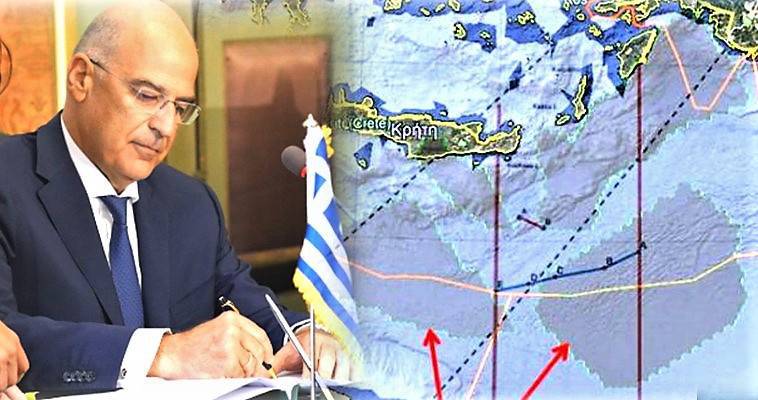Anastasios Lavrentzos: Greece ceded sovereign rights to Egypt on the altar of the Turkish-Libyan memorandum
08/08/2020
The signing of a partial demarcation agreement between the Greek and Egyptian EEZs was announced abruptly on Thursday afternoon. The Agreement is the culmination of the Greek government’s efforts to repeal the illegal Turkish-Libyan Memorandum and to a significant extent succeeds. But at what cost?
As it turns out, the agreement has the following two main features:
First and foremost: The agreement recognizes with a Greek signature that Crete has a reduced EEZ influence. As it turns out, the distribution of the intermediate sea area between Greece and Egypt was not based on the principle of the equidistant middle line. On the contrary, it was done in a way that it leans against the interests of Greece, which results in a 56% – 44% in favor of Egypt. This is a very important Greek concession, because it concerns not only the acceptance of a smaller EEZ than is legally Greek, but also the recognition that an island the size of Crete can have a reduced influence on the EEZ.
Secondly, it is a partial demarcation agreement, which extends up to the 28th meridian. That is, the demarcation does not include Kastellorizo, which is the most controversial point, not even the whole of Rhodes. To be precise, the 28th meridian intersects Rhodes in the middle. This means that even by omission, Greece seems to have respected the Turkish expansionist policy, which considers the region east of the 28th meridian its own vital space.
The partiality of the demarcation, however, also suffers on a purely negotiable level: you do not throw your biggest card on the table, which is Crete, to get half a deal. Because if you back down on what is the major asset from the beginning, what will you use to negotiate in the difficult times, that is, when Kastellorizo will come under the discussion and when Turkey will probably be up against you?
The partiality of the demarcation, however, also suffers on a purely negotiating level: you do not throw on the table your biggest card, which is Crete, to get a half deal. Because if you go back to the major from the beginning, with what stocks will you negotiate in the difficult times, that is, when Kastelorizo will be in the discussion and when you will probably have Turkey against you?
The continuity of the Greece-Cyprus EEZ is lost
The above shows that the Greek government, under the pressure exerted by the Turkish-Libyan memorandum, has proceeded hastily with a series of arrangements, which, in order to achieve, accept discounts on its sovereign rights. This diminution had already started from the Greek-Italian EEZ delimitation agreement. This time, however, the concession of reduced EEZ influence does not concern the Othonoi and the Strofades islands and fishing rights.
It concerns Crete, ie one of the largest islands in the Mediterranean. And of course, if Greece recognizes with its signature that the “mother of all islands”, Crete, has a reduced EEZ influence, then what influence can it claim for the other Aegean islands and primarily for the small Kastellorizo, when in fact it has Turkey against it?
As far as the Kastellorizo complex is concerned, it is now obvious that there will probably not be a full EEZ effect. And of course such a thing can not be claimed even before an international court, since Greece itself has set a negative precedent: it has abandoned the principle of the equidistant middle line and has recognized a reduced EEZ influence on its largest island, which is not even next to Turkey or any other country.
As we said at the beginning, the Greece-Egypt Agreement was made with the aim of undermining the illegal Turkish-Turkish memorandum. And this, to some extent, it achieves. But in the end it is detrimental to Greek interests, and in fact not so much for what it ceded, but mainly to what under this agreement will be granted in the future. And one of them is the continuity of the Greece-Cyprus EEZ which should be considered a casue lost for good.
To be precise, it has always been a lost cause, since the Greek state systematically avoided developing economic life in Strongyli, which is the key island for achieving the continuity of the Greece-Cyprus EEZ. In other words, it systematically avoided establishing full maritime rights based on the provisions of Article 121 of the UNCLOS Treaty, which gives normal EEZ rights to islands that are inhabited and have economic life.
The Turkish – Libyan memorandum produces results
But there is something else that was implicitly granted. The movement of the EEZ limit to the north, ie to the Greek side, took place on a probable deposit of natural resources (see map below by Ilias Konofagos). So here we are dealing with a concession on mineral wealth, which of course does not only concern this area. Because it is obvious that if today Greece has given part of its EEZ to Egypt, then the same will probably happen tomorrow with Libya.
At least that will be asked of Greece in a possible future negotiation based on the current precedent. In the unfortunate case, then, that Greece will accept a new discount on its sovereign rights (perhaps under the pressure of the foreign factor) it will cede territory to the important deposits that are likely in the southeast of Crete. And of course in such a case one can guess to whom Libya will grant extraction rights to its allotted deposits.
So, has the co-operation been decided with the blessing of the foreign factor and only at this stage do we see the pieces of the puzzle being assembled? Time will tell. For the time being, however, it is clear that since the signing of the illegal Turkish-Turkish memorandum, a chain of negative developments has begun for Greece. In its attempt to neutralize it, Greece has begun to cede parts of its sovereignty in the form of ransom that it pays to extract the signatures of third parties.
And the third parties, of course, are well aware of this and ask to be granted Greek sovereign rights by signing contracts for the lion’s share. This is the cost that the country pays for years of omissions and inaction and because things were not done at the right time. And the responsibilities, of course, weigh on the entire Greek political world and not just the current government, which may be called upon to write part of the epilogue.
However, Greece is mistaken if it thinks that even at such a cost it will guaranteee its truncated sovereignty. Because sooner or later it will have to ratify it against Turkey. Let us, therefore, be ready for the continuation of the crisis and let us formulate, even now, an overall strategy for the Eastern Mediterranean and the Aegean. We must finally stop responding spasmodically to Turkish challenges, because improvisation costs money.





